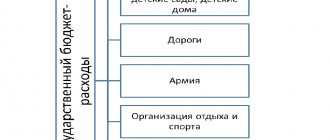What is considered truancy?
To understand whether a person’s absence constitutes absenteeism, you should refer to the norms of the Labor Code of the Russian Federation. The exact definition of absenteeism is given in subparagraph “a” of paragraph 6 of Art. 81 of the Labor Code of the Russian Federation - this is recognized as the absence of an employee from the workplace for more than 4 hours in a row during the working day or throughout the entire shift and at the same time the employee does not have valid reasons for such absence.
In practice, there are valid and disrespectful reasons for absence from work. Employers independently decide which category to classify an employee’s failure to appear in, since the Labor Code of the Russian Federation does not strictly regulate this point. If an employee had good reasons for not coming to work, but the employer refuses to recognize his arguments and fires him, the employee has the right to appeal such a decision in court.
conclusions
The manager must soberly assess the reasons for absenteeism and apply punishment taking into account the employee’s behavior in previous periods.
After the employee appears at work, he should be presented with an absence report and required to explain in writing the reason for his absence - examples of explanatory notes.
If there are good reasons, these documents are filed in the employee’s personal file, and he continues to work.
Hours of absence are not paid if there are no documents on the basis of which payment must be made (subpoena, certificate of incapacity for work, etc.)
What are valid reasons for absence from work?
Valid reasons for absence from work, in accordance with legislative norms, may include: as follows:
- Passing a mandatory medical examination (in accordance with Article 213 of the Labor Code of the Russian Federation).
- Donation of blood and its components (the procedure for granting exemption from work to donors is regulated by Article 186 of the Labor Code of the Russian Federation).
- Non-payment of wages by the management of the enterprise. If the delay in payments is more than 15 days, the staff has the right to suspend the performance of work duties until the delayed amount is paid to them, and the employer must be notified in advance of the failure to appear in writing (the list of exceptions is given in Article 142 of the Labor Code of the Russian Federation).
- Involving an employee during his working hours in the performance of public or state duties (Article 170 of the Labor Code of the Russian Federation).
Personal reasons include, for example:
- Illness of the employee himself or one of his family members.
- Call for military training.
- Utility accidents, fire, flood, etc. emergency situations at the citizen’s place of residence.
- Participation in litigation.
Examples of valid reasons for absence from work due to force majeure situations:
- breakdown, accident of public transport, etc.;
- getting into an accident;
- natural obstacles (ice, heavy snow, hurricane, etc.), etc.
Having received written permission from the employer, the employee may be absent for the following reasons:
- death of a close relative;
- birth of a child;
- wedding, etc.
Also, a valid reason for absence from work is the occurrence of force majeure circumstances that the employee cannot influence: disasters, accidents, weather disasters, etc.
Other valid reasons for absence from work not covered by the Labor Code
Situations that can be classified as valid reasons, despite their absence in the standards of the Labor Code, also include all circumstances when an employee did not have the opportunity to visit the workplace or appear on time in the absence of his fault in what happened. So, we can consider such cases using several fairly simple and understandable examples:
. If an employee was involved as a witness or witness, and was also detained on suspicion of committing a crime, for example, during an orientation or during any other investigative measures, the courts clearly recognize such situations as a valid reason for failure to show up for work or being late, despite the fact that the Labor Code of the Russian Federation does not consider them in principle.
Law enforcement actions- Utility accidents . If an employee has a utility accident at home without his fault, including an elevator breakdown, a pipe break or a gas leak, which prevents him from going to work, then the period of eliminating the negative consequences of such events is also in most cases recognized as a valid reason.
- Other unforeseen circumstances on the way to work . Getting into an accident, especially if the employee is innocent, or traffic jams due to unplanned road closures or an accident, are also, according to judicial practice, most often considered a sufficiently valid reason for being late for work. However, complete failure to appear in this case may not have a valid reason.
- Emergencies . Catastrophes, natural disasters, declaration of martial law and other similar situations, which, in accordance with the law, relate to special periods, may be considered a valid reason for absence from work. However, if the employee’s work activity relates to the public service and, in particular, involves carrying out rescue or other work, then such circumstances may not be recognized by departmental documents as sufficient for failure to appear and entail the full application of sanctions established by law.
In all of the above cases, it is recommended that the employee be able to provide some evidence to prove that the reason is valid. Moreover, in the event of a dispute, additional factors are taken into account. For example, if an employee was daily or simply repeatedly late or did not show up for work due to utility failures or traffic jams, then this is clearly his fault, since he should have foreseen the impact of these factors on his work activity and ability to fulfill his duties to the employer.
Not valid reasons
These are considered to be situations where an employee did not show up for work and did not notify immediate management, and also did not provide any supporting documents. Unexcusable reasons for absence from work are grounds for the employer to take disciplinary measures, the purpose of which is to prevent similar behavior in the future. It should be noted that if an employee warned the head of the organization in advance about absenteeism, such a situation cannot be considered absenteeism.
Missed time or was absent for a valid reason
You cannot show up for work without a compelling reason. Every worker knows about this.
Absenteeism for an employee may result in:
- the need for an explanation with the employer and subsequent submission of a corresponding note - this is at a minimum;
- Dismissal under an article for absenteeism is the highest penalty.
Absenteeism should be considered the actual absence of an employee from his workplace without good reason, lasting more than 4 hours (subparagraph “a” of part 1 of Article 81 of the Labor Code of the Russian Federation).
At the same time, if nothing is specified in the employment contract about a specific workplace, it is inappropriate to talk about absenteeism.
For example, when you are not where you usually work, but on the territory of the enterprise.
Absenteeism is preceded by a written explanation submitted by the employee to his employer and containing possible reasons for such absence. If the employer considers the stated reasons to be disrespectful, he may fire him.
If the employee does not agree with the dismissal, the issue will be resolved in court. Based on the supporting documents submitted by the plaintiff, the court will determine whether the reasons were valid and, accordingly, there was absenteeism or not.
The whole problem is that the law does not contain a specific list indicating the objective reasons for the employee’s absence from the workplace. However, after analyzing labor legislation, we can conclude that there are several groups of similar reasons.
How can an employee of an organization justify absence from work?
In Art. The Code of Civil Procedure of the Russian Federation states that each party to the proceedings is obliged to confirm the circumstances to which it refers. For employees, evidence of valid reasons for failure to appear will be a medical certificate, sick leave, documents about an accident, a summons from the court and other supporting documents. The employer can use the employee’s absence from the workplace and witness testimony as evidence of absenteeism.
If the employee fails to provide supporting documents, the decision remains with the employer. Therefore, it is always recommended to notify management in advance about your absence, because if the matter comes to trial, it will be easier for the employee to prove that he had a good reason for not showing up for work.
Objective reasons
Force majeure circumstances act as objective reasons indicating the impossibility of an employee being at his workplace. These could be weather conditions, disasters, man-made accidents and those on the road, military operations.
If the employer disagrees with the objectivity of the reasons being considered due to insufficient justification by the employee, the latter has the right to go to court.
As judicial practice shows, in such cases the court can accommodate the employee halfway. Moreover, in accordance with the court decision, the worker can even be reinstated at work. The main thing is not to put off going to court until later. The court allows a month to file a claim for reinstatement at work (Article 392 of the Labor Code of the Russian Federation).
Unreasonable absences
If there was a failure to appear for the exam without a good reason, then it is considered absenteeism. Such absences become reasons for expulsion from the university. If there is no valid justification, the instructor will assign a failing grade. And you can close the exam only after the end of the session within the time frame set by the dean’s office. If a student comes to classes without a grade, then this can also be considered a failure to appear without good reason.
During the current session, the student will not be able to retake the exam. With the question of how many attempts there are to correct his grades, he should contact the teacher. Usually the rector gives no more than three additional opportunities to retake the exam. At the same time, he writes an order that determines the period for liquidation of debts. This can be done either after the end of the session during the holidays, or in the first two weeks of the next semester. But if a student accumulates three or more “tails” during his studies, he will be expelled.
In any case, the student will try to justify his absences, but banal reasons cannot be positive:
- lack of transport;
- problems with the alarm clock or calendar;
- feeling unwell without confirmation;
- Job.
Being late for a bus, trolleybus, tram or its absence is not a valid reason for not appearing for the exam. One of the most common reasons for absence is that the student did not hear the alarm clock or mixed up the day of the calendar. In this case, the teacher will also not make any concessions.
If a school or university student feels unwell, but cannot confirm this with certificates or relevant documents, this is counted as an absence. Recently, the main reason has become work , the discrepancy between her schedule and studies. The student must understand that getting an education comes first for him. Because of his work, no one will reschedule the exam.
Consequences of no-show
Many students believe that gaps are easy to fill, so attending classes and even exams is not necessary. In fact, every no-show will have its own consequences. Sometimes they can be sad:
- loss of scholarship;
- the need to study during the holidays;
- additional retake fee;
- expulsion from the university.
For absences for a valid reason, the teacher must mark the exam sheet as “unsatisfactory”, that is, “two”. This mark does not allow the student to receive a scholarship in the next semester. In some cases, he not only loses his source of income, but also begins to pay for his education. That is, it is transferred from the budget to a contract basis.
If the university rector has set additional deadlines for retaking the exam, the student will also have to attend the university in the summer or during the winter holidays. This is not convenient for everyone, since some students leave the dormitory for home at this time. They simply have nowhere to live while retaking the exam. You will have to rent an apartment or ask to stay with friends and relatives for a while.
In some universities, additional teachers work as tutors. And every hour of their work is not cheap. Not all teachers agree to spend their time with truant students for free. The cost of one hour of examination will depend on the academic degree of the teacher, as well as his field of activity. Some universities in Belarus have introduced a similar practice, thanks to this there are much fewer absences and even delays.
If a student fails to appear for three or more exams, he is automatically expelled from the university. He can make up one or two absences during the holidays or in the next semester. In other cases, you will have to pick up the documents. Upon completion of the second or third year, the student will receive an appropriate certificate of completion of training. But a higher education diploma will no longer be available to him.










